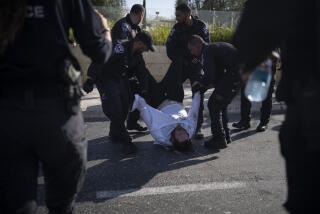Only a PLO Signal Can Shift Israeli Course : Shamir May See Far Right’s Gains as Mandate to Resist Peace-Making
TEL AVIV — The final votes in the Israeli election have not yet been counted, and the long and arduous task of coalition building has barely begun. Nevertheless, two things are already clear: that Likud leader Yitzhak Shamir, as head of the largest single party, will form the next government, and that the religious parties, which share many aspects of Likud’s political world view, have substantially increased their following in the Israeli electorate.
But, contrary to some interpretations, these results do not represent a sharp change of course for Israeli politics.
In the 1984 elections the nationalist and religious parties together secured 61 Knesset seats; barring some last-minute change, they will have gained 64 seats this time. Even this small rightward shift is probably attributable, at least in part, to the terrorist bus attack that killed a young woman and her three children on the eve of the election.
Moreover, Likud’s chances of forming a government were helped by the Israeli Supreme Court’s disqualification of Meir Kahane’s Kach Party on grounds of racism. If Kahane had run and gained two or three seats, as many polls had been predicting, he would almost certainly have remained beyond the pale for Shamir, as he was in 1984. Instead, it is likely that many Kahane supporters voted for other, more “respectable,” ultra-nationalist parties that are acceptable coalition partners for Likud.
To some extent the precise outcome of the election is therefore due to accident and circumstance.
As always, however, the numbers alone do not tell the whole story. Because secular nationalist parties in Israel have become more nationalist, religious parties more religious and religious-nationalist parties more of both, the election results reflect a longer-term process of radicalization.
For many years, experts on the Middle East have been warning that failure to achieve peace would lead to growing radicalism in the Arab world. In fact, it is Israel that is becoming radicalized by the combination of cynicism, frustration and anger inherent in a perpetual state of war.
There are, of course, other reasons for the growing popularity of simple-minded nationalist slogans and visionary religious politics. One is simple demographics; religious families are generally far larger than secular ones, and Sephardic Jews (who tend to identify more with Likud) have somewhat larger families than do European Jews.
Another factor is the indulgence of such slogans and politics by important elements abroad. The U.S. government permits the secular nationalists who make decisions on the basis of cost/benefit analysis to believe that a right-wing government will not damage the U.S.-Israel relationship; Diaspora Jews permit Israeli politicians to believe that coercive religious legislation will not damage the relationship between Israel and Jews abroad.
In the last analysis, however, the most important cause of radicalization in Israeli politics is the belief that Palestinian hostility is permanent, absolute and irreconcilable, and that the only appropriate response is unwavering steadfastness and firm belief in Israel’s strength--military or divine.
Every attempt to promote a policy of peace based on compromise that runs into a wall of rejectionism or a fog of evasive ambiguity from the Palestine Liberation Organization simply expands the circle of Israelis who reject elaborately constructed rational analyses in favor of the simplistic formulas that are the essence of radicalism.
As long as the PLO refrains from adopting a clear peace program, one that includes the explicit recognition of Israel’s right to exist and an unequivocal renunciation of terrorism, the slow but inexorable radicalization of Israeli politics and society will continue. However, if the PLO ever does commit itself to such a program, then even a right-wing government like that about to be formed in Israel will at least be compelled by a new constellation of forces to reassess its policies. And even if that government tries to hold fast to its nationalist vision and territorial maximalism, its foundation in Israeli public opinion will be severely, perhaps decisively, undermined. But it is only such an action by the the PLO that can change the terms of the domestic debate in Israel and allow reason to prevail over passion, and hope over fear.
If the Palestinians decide that this is the course that they must choose, they can do so perhaps even before the next Israeli government is formed. The Palestine National Council is scheduled to meet on Nov. 12. At that session the PLO will have a chance to tell Israeli voters whether they were right or wrong.
More to Read
Sign up for Essential California
The most important California stories and recommendations in your inbox every morning.
You may occasionally receive promotional content from the Los Angeles Times.










